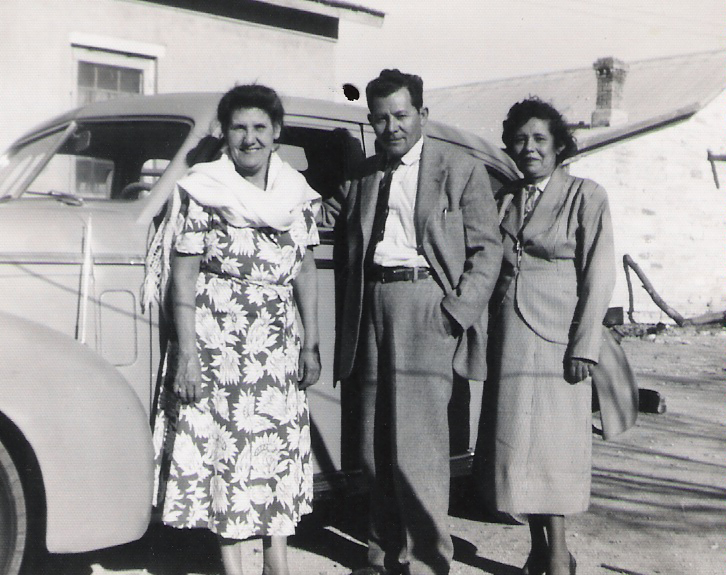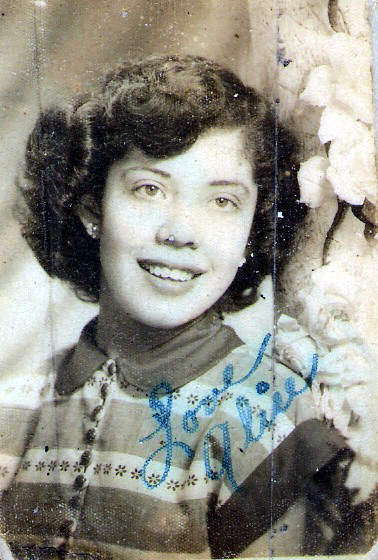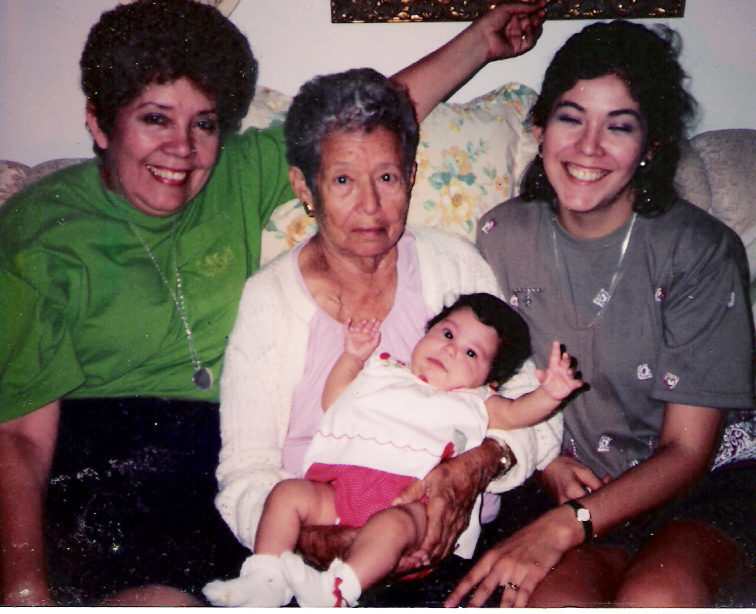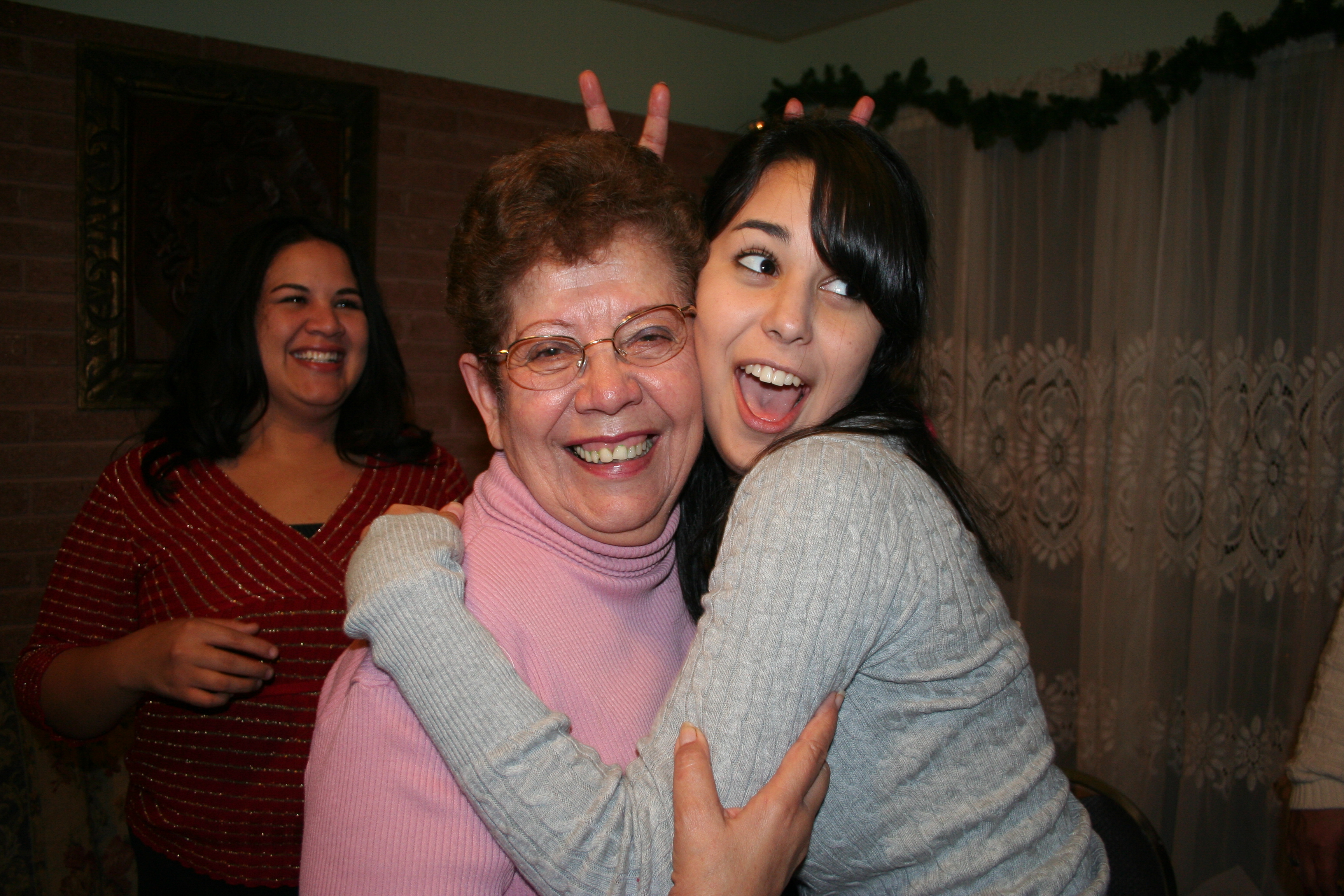INTRODUCTION
Alicia Besa Gamez was born to Andres Besa and Teresa Guerra-Besa, on January 4, 1931 . She was the oldest of nine children, six sisters and three brothers, which includes a twin brother, Arthur, whom she preceded by fifteen minutes. Gamez was born in Eagle Pass, Texas and moved to San Antonio, Texas when she was nine years old, where she has remained a resident for fifty-eight years.
Alicia most certainly made her parents proud when she received her high school diploma (her father received a fourth grade education and her mother received a middle school education). After graduation she worked as typist at an organization called Aid for Dependent Children for four years. She then was hired by the federal government to work at Kelly Air Force Base until she was married in 1956 to Charles Gamez. After having her first child, Brenda Gamez, she remained at home for several more years. She was then called in 1958 to work on the draft selective service board, working there for a number of years. In 1960 she gave birth to her second child, Kathleen Gamez Villanueva, this time taking only nine months maternity leave. Alicia Gamez resumed her job at the draft board and had her third child, Charles "Rusty" Gamez, in 1964. She worked on the draft board until 1976 when the board was discontinued. After that time Gamez worked at several military bases, including Fort Sam Houston, where she worked for several years selling homes.
Gamez's hobbies include drawing, painting, sketching, and anything else involving the arts. She is a Roman Catholic Christian and is involved with her church on the South Side of San Antonio. She is my grandmother.
TRANSCRIPTION
What are some of your earliest childhood memories?
Well, I am the oldest so I have memories of all eight of my younger brothers and sisters. I was a twin, with my younger brother, and then there was all girls and two boys at the end. We had a lot of fun together, of course it was hard sometimes, but We had a lot of fun.
So, did you grow up in a really small house?
Yeah, it was a small home. It was one big room and we had to make a kitchen on one side and the bedroom on the other side. My mother and daddy slept there and then we had little mats on the side so that we could sleep there or sometimes we slept outside.

So that answers the next question, "how many siblings do you have," eight.
Yeah, I had eight, and there are nine children in the family.
I guess you also kind of answered this one, "what do you remember about home-life with your siblings?"
Well, I was the oldest and everybody followed what I did, so I was really careful with what I did. But, they always say that I got away with more because I was the oldest, but that's not true.

[laughs] Yeah. Well, what kind of chores were you assigned and how was it different, the girls versus the boys?
Oh, well, of course the girls did the house work and some of the cooking with our mother's instruction. The boys did the outside, we used to have like a little garden and planted some vegetables and the boys took care of that and of course the boys…my brother[her twin] was the oldest, so he was the one that was in charge of that. I remember that we used to sell some of the produce that they grew: squash, tomatoes, jalapeños, and all that. So we used to put them in a little wagon and my brother and I would go out and sell.

Where would you sell them?
We used to sell it door to door.
Oh cool!
Uh huh. He was the salesmen because I wasn't very good, I wanted to give away everything. Yeah, he was the salesman.
Did your mother work and if so, what kind of career did she have?
My mother always worked, or it seemed like that. When she wasn't having children she was working because we were so many and my daddy didn't have a high paying job. My mother was always a seamstress
. She would sew and design all our dresses and my father would bring in the money. My father started working the factory where my mother used to sew, he fixed the sewing machines. She did that throughout the years. Of course, later on when we got so many [became a larger family] my daddy's aunt moved in with us and she did some of the work and some of the cooking when my mother went out and did all of that.
What were the roles of women in the home in the time that you were growing up?
Well, they did everything. They used to cook and sew. I even did some sewing at home with my mother. The women didn't go out and work at the time that we were growing up. My father would bring it in, he was a mechanic, a janitor…he did everything that he could to bring in the money.
What opportunities were available to women of your mother's generation?
In my mother's generation there wasn't too much. It's a good thing that she had a little bit of education, I think right now it would be [equivalent to] middle school. My daddy only had a fourth grade education, but my mother was smarter and she would go out and work, but there wasn't too many jobs available. The women did cooking, sewing, and housework.

As far back as you can remember, was it ever looked down upon for husbands to have their wives work? If so, why was this?
Well, I think so…it was. But, in our case, we were so many so my mother had to work, but she would bring the sewing to the house and do the sewing at home and we helped her. But, yeah I guess it was looked upon as him not having enough for his children, but he was always a hard worker.
How much education did you receive?
We all got a high school education and the three boys got a college education. The girls didn't we all went some kind of business school. I went to Darves College for one year, but I really didn't too much out of it.
What was the average amount of education that girls your age were receiving?
Well, I don't thinking a lot of them went [to high school]…they had middle school at the most. Of course, we all went to high school, but some in our generation, mostly girls, did not complete high school.
Oh, so that was really good for you completed high school!
Uh hum.

What kind of courses did you take in school?
I took a lot of business courses. I took typing and bookkeeping, which I loved, but I never did go into it too much. I liked artwork, so I took art.
Did you play any sports in school?
No…we didn't have time for that. We had to come home. We couldn't play sports.
I really would have loved to be in volleyball.
So, they did have sports for girls?
Yeah, they did, but not too many; it was mostly for the boys.
When you were a teenager, what were your hobbies and what kind of things did you do for fun?
Well, we would go to dances and parties. My mother was always really artistic so I took after her.
What was in fashion when you were a teenager?
Well, we used to use the ballerina shoes and big puffy dresses with the
crinoline underneath, you know. Our hair was always puffy; of course I didn't have to do anything because my hair is curly.
We would go in group dates. We would go in a big group and meet the boys at dances.
What that like school dances?
Yes, school dances and the girls club when we got a little bit older.
My brother got the group together and I remember that we were all in high school and some of them younger. I remember when the Vietnam War started there was a lot of boys that were in the reserved and most of them had to go in the service and some of them didn't come back....[pause] We were out partners [laughs].
How did dating work when you were a young girl? What kind of things would you do? Could you go alone?
No. Dad was kind of strict. Since I was the oldest I had to start the dating and all that. I remember one time this boy asked me to go a dance with him, his name was Charlie [smiles]…which I married later. He said I want you to go to a dance with me and daddy said yes, you can go. I told Charlie yes, you can come for me. When he came for me, he came in a car with a little boy and daddy said [to Charlie] "I'm going to take the girls and if you want to you can follow us". So, we met over there and coming back Charlie said [to her father], "well, can I take her home?" and daddy said "NO! I'm going to take her back home and you can visit her there." So, that's what we did.

Wow, so your dad was really strict with you?
My father was strict, yes.
So what do you think about kids now-a-days who go by themselves on dates? Do you think it's really different?
Well, I think times have changed, but not that much. I think you still have to be careful with dating and all that, but I think parents are more lenient now-a-days. You have to be lenient, but you have to be a little strict, also.

At what age did women normally get married?
Um, they got married younger than now. I was twenty-four when I got married, however, by that time I was considered an old maid because I hadn't married. Now-a-days they get married a bit older because they get their education, which is fine, I think that's the way to go. Once you get married, you get tied down to that one person and it's a little hard sometimes [to go to school].
So, would you say that once you get married it's expected that you don't go to school?
At the time, yes. Women didn't go to college, it was the man. As you can see with my family, only the three boys got an education and the girls only got commercial courses.
How, would you say, the institution of marriage has changed since you were married?
I think it has changed some, but let's not forget that marriage is marriage and you have to be careful. It has changed in a way that a lot of people just sleep together and I don't think that's a good idea because the man or women can always say "ok, let me get another one..." It's very easy to break that. A marriage is a very sacred thing to me.
I agree.

When you started working, what kinds of jobs were available to women versus men?
I was lucky enough to have office jobs all the time. So, I started when I was right out of high school or in my senior year I started working at San Pedro Pharmacy and from there, of course, my mother knew these ladies who gave me a job as a dictaphone operator. So, I always had an office job.
How was that compared to men? Would you say that since men your age had more education…
The men were always the bosses. You would go to a place and it was always the men that had the offices and what have you.
So it would be unheard of to have a woman…
It was unheard for a woman to in charge of an office.
Ok.

You told me that during the 1960s you worked on the draft board, what kind of people did you work with and what kind of clients did you see?
Ok, the people were great. I enjoyed working there very much. I started working as a typist and I got to be an executive secretary. Yeah, we had quite a few demonstrations there during the Vietnam Era, we drafted some boys and they [the protestors] didn't like the idea that the draft was drafting. One time they had a mock funeral, well…several times they had mock funerals. They would have a casket and would chant and go around the office and all that; we had to go in through the back. I remember one time I had to come in real early with my friend and we had to come in through the back because they were already there by the time we got there. This one time we opened the door, this one man was dressed as a skeleton and he sat down right in front of us and he stayed there the whole day. He was just staring at you and we couldn't type! We would try and he was just staring! It was very hard but, pretty soon they got tired of it.
Wow, that's pretty intense.
Yeah, it was right there on Main Street.

So the protests finally ceased after a couple weeks?
Well, the Vietnam War started ending and the protestors just gave up, I guess. But, we always had people come in and question us.
Were you ever treated any differently in the work place because you were a woman?
Well, I don't think so…I don't think I was discriminated against. There at the draft board I had a woman that was in charge, which was very unusual. But yeah, as men came in they were always hired, being promoted, or becoming the bosses of the section or whatever. I guess yes, there was always a little difference, but I never had trouble.
Is there anything else you would like to add to this interview?...Anything else you'd like to say?.... interesting stories?
Well, I worked all my life, but I had my children. I always got a job that they would let me go if my children needed help, like if they had plays or some program that they wanted me to go. I always made sure that the supervisor knew [that I had children]. That's why the draft board was so good to me, because as soon as I told the lady [supervisor] that I had children she said "well, you can be sure that whenever your children need you, you can go." But I worked all my life when I was married and I enjoyed it too. I enjoyed all my jobs.
Ok, well thank you!


ANALYSIS
Upon completing this project, I now fully realize that history is not just what is printed in the pages of the standard history textbook. It's unfortunate that history is most often taught in relation to those people who made enough of an impression on the world to merit a place in our books. What I have learned from this project is that it is the common people of the era that can truly give an accurate depiction of what everyday life was like.
One of the important points made during this interview was the fact that most women did not have an opportunity to receive a formal education and therefore did not have an equal chance of advancing themselves in the career world.
It was particularly interesting conducting this interview because it gave me a chance to learn some new things about my grandmother. For example, I had no idea that her whole family, all eleven of them, lived in a one room home!
One of the things my interviewee spoke most passionately about was her experience with the protests and uprisings of the Vietnam War. This was especially true because she worked in a place that had a direct connection with the war, thus her first had experience with the commotion. What I had not known was that this opposition was felt not only nationally, but locally.
I have spoken before to my five great-aunts, her sisters, about the stories told in this interview as well as look into dates given to verify that I have the correct information. This is one of the inconvenient facts about learning about history orally; extensive fact-checking must be done in order to ensure the accuracy of the stories. One of the benefits of learning about history in this way is that one gets a more personal recollection and understanding of what was happening in the world in the time they are describing. I believe that Oral History in conjunction with traditional learning is the perfect combination to learn more about past events.
TIMELINE
- 1931- Alicia Besa Gamez was born to parents to Andres Besa and Teresa Guerra-Besa in Eagle Pass, Texas
- 1940- She moved from Eagle Pass, Texas to San Antonio, Texas with her family
- 1949- Graduated from high school
- 1950- Began working as a typist at Aid for Dependent Children
- 1956- Was married to Charles Gamez
- 1957- Had her first child, Brenda Gamez
- 1959- Began working on the draft board
- 1960- Had her second child, Kathleen Gamez Villanueva
- 1964- Gave birth to her third child, Charles "Rusty" Gamez
- 1976- The draft board was discontinued
- 1977- Began working at Ft. Sam Houston selling homes
- 1994- Retired
ANNOTATED BIBLIOGRAPHY
- The Handbook of Texas Online
I used this online resource in order to provide further town history of the two cities in which my interviewee was born (Eagle Pass) and lived through the duration of her life (San Antonio).
It was produced
in partnership with the College of Liberal Arts and the General Libraries at the University of
Texas at Austin. Copyright © The Texas State Historical Association.
- A History of the Seamstress Profession My grandmother's mother earned money for her family of eleven by working as a seamstress. This link provides a more in-depth history of the profession. ©1996-2008
Women in World History Curriculum
- A History of Crinoline As a young girl, my grandmother wore dresses with crinoline underneath. This link gives a history of how crinoline developed into a fashion. ALL RIGHTS RESERVED. Fashion-era.com reserves the right to add or delete information, graphics and links. Copyright © 2001-2008 on all content, text and images in Fashion-Era.com.
- Dictaphone Operator History As a young adult, my grandmother began working as a Dictaphone operator. Found on google e-books, this exert includes a more detailed history of the early beginnings of this career. The Expert Typist
By Clarence Charles Smith
Published by The Macmillan company, 1922
Original from Harvard University
Digitized Oct 24, 2007. Page 127
- Photographs and/or documents on this website were provided by Alicia Besa Gamez and Kathy Villanueva.The Very first photo was taken of my grandmother in 1953 in San Antonio, TX.
The next photo is of Alicia's mother, Teresa Guerra-Besa, courtesy of Alicia Besa Gamez.
The next two photos are courtesy of my grandmother, Alicia Besa Gamez and her twin, Paul Besa, taken during her childhood in Eagle Pass, Texas.
The fifth photo is a school photo taken in San Antonio, TX of Alicia Besa Gamez.
The "Love Alice" photo was taken of my grandmother in 1955 and given to my grandfather before he served in the navy.
Next, is a picture of Alicia Besa Gamez and Charlie Gamez at a party in San Antonio, TX before they were married.
The eighth picture is of my grandmother and grandfather, Alicia and Charlie, on their wedding day in 1956.
The next photo is taken of my grandmother, Alicia, my aunt, Brenda, my mother, Kathy, and their family dog. This was the first home that the Gamez family owned and one which still stands tall on Price St on the South Side of San Antonio.
The ninth photo is of the entire Gamez family: Alicia, Brenda, Charlie, Kathy, and Rusty Gamez one Christmas in 1971.
The next photo is courtesy of www.library.brookly.cyny.edu, which accurately depicts the protests of the 1960s that Alicia Besa Gamez experienced while working on the draft board.
The penultimate picture is of four generations of Gamez women: Teresa Guerra Besa, Alicia Besa Gamez, Kathy Gamez Villanueva, and Olivia Villanueva in 1989.
The last picture is one of my interviewee and grandmother, Alicia Besa Gamez and myself during Christmas.
Return to Oral History Projects

